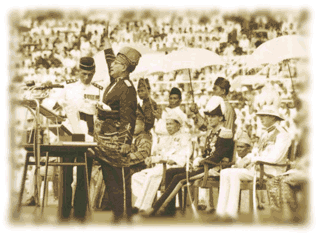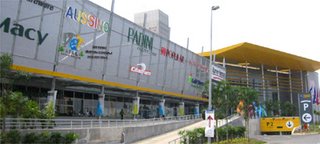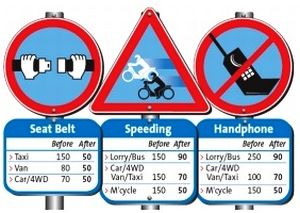If you had caught the announcement in The Sun paper, chances are you would have attended this audience-packed forum organized by the DAP at the Chinese Assembly Hall in KL. Must salute DAP for putting together an interesting panel of speakers, they were;
1. former UN and World Bank economic advisor, Prof. Dr Lim Teck Ghee who gave us the facts and figures from his independent research.
2. former Kumpulan Guthrie Bhd Chief Executive Director, former PNB CEO,Tan Sri Abdul Khalid Ibrahim, interesting perspective as a Malay with a corporate mind and affirming’s Parti Keadilan’s stand.
3. Opposition leader, YB Lim Kit Siang, the take on the political impacts of having the governing body misusing the NEP policy.
4. DAP Secretary General, Lim Guan Eng, who gave his opening remarks, with the notion that everyone is truly against the continuation of NEP Policy.
5. UKM Political Science Professor, Dr P Ramasamy, giving his academic view and lending his voice for the Indian community.
Need to know what NEP is? It stands for the New Economic Policy or Dasar Ekonomi Baru. Wikipedia gives a very good historical background on this. An important point was that this had came about to address the issue of socio-economic disparity of the Malays, a brain-child you can say as an aftermath of the May 13 incident. Read it here. Speaker P. Ramasamy equates it to more as a “Never Ending Policy” or a “Not Enough Policy” indicating how this has benefited only a small group of people. Read on and you will know the reason for his stand. (Just managed to scribble through the speakers’ speech, so hopefully it’s more or less accurate.)
Some interesting points (some modified based on my perception and opinion) from Prof. Lim’s informative presentation:- 1. There were some success in this policy from the period 1970-1990, mainly due to the Felda schemes and Free Trade Zones. However, these economic achievements are not unique to Malaysia, other Asian countries, Latin America and Africa were also experiencing the same. It’s not a direct cause from NEP policy.
2. The Human Development Index, which measures the effectiveness of investments in Human Resources and our competitiveness level show that Malaysia has fallen from being at position 50 in 1975 to position 61 in 2005. This indicates that Malaysians are indeed flagging behind.
3. The NEP has benefited the “Distributional Coalitions”, ie a small influential group of selects who aim to close ranks against competition. They are namely Political (UMNO/MCA/MIC), Bureaucratic (PNB), Military (LTAT), Religious (LUTH). There is usually an overlapping membership and this translates to a rough figure of 3000-4000 people only who profiteers from NEP.
4. NEP instruments are privatization (privatized gains and socialized losses) <- this simply means that when there are gains, only a small group enjoys this but losses are shared nationally. Everyone pays but only a select few gains, corruption/nepotism/cronyism, multiple directorships and unsecured loans. Some notable bail-outs: Bank Bumi, Renong Group, Lions Group, TOTO, NST, Pantai, etc the list was some 3 pages long.
5. Poverty rates have not improved much and are likely to deteriorate. Widening gap of the rich and the poor. Inter-racial harmony is worsening.
Solutions: Need to replace racially-biased economic entitlements, corporate share equity with a more needs-based selective process. Dismantling of entrenched bodies that have basic self interest for example the GLCs.. Inter-ethnic partnerships based on merit should be preferred for better harmony of racial groups. Focus on development on SME instead of the already rich and self-sufficient big corporations.
Hope this has been useful information for all of you. I’m about only half-done. Will probably have a Part 2 to this when I have time or if it generates enough interest for a continuation. Hehe..
P.S. if you are interested in what other dialogues DAP might organize, please visit this. Have to make it clear that I'm not an advocate but just think that it'll be good to have different perspective of things aside from what we are fed by the mainstream media.
 I told myself I would never pay to watch Chinese flicks. I don't give them enough credit maybe. But I went to the cinema to watch the premier of Rob-B-hOOD FREE! Has all the usual cliches and plot seems to be a cross between Ocean's Eleven and Three Men & A Baby. So the plot's nothing original. But this flick has Jackie Chan. If anything, I doubt there is any other stuntman in the world who's as dedicated as him. I take more delight in watching his choreography in his fight scenes than watching lousy performance of the supposed HK heartthrob, Louis Koo. Check out the scene of Jackie Chan hoping from one conditioner unit to another from the top floor of a building.
I told myself I would never pay to watch Chinese flicks. I don't give them enough credit maybe. But I went to the cinema to watch the premier of Rob-B-hOOD FREE! Has all the usual cliches and plot seems to be a cross between Ocean's Eleven and Three Men & A Baby. So the plot's nothing original. But this flick has Jackie Chan. If anything, I doubt there is any other stuntman in the world who's as dedicated as him. I take more delight in watching his choreography in his fight scenes than watching lousy performance of the supposed HK heartthrob, Louis Koo. Check out the scene of Jackie Chan hoping from one conditioner unit to another from the top floor of a building.































